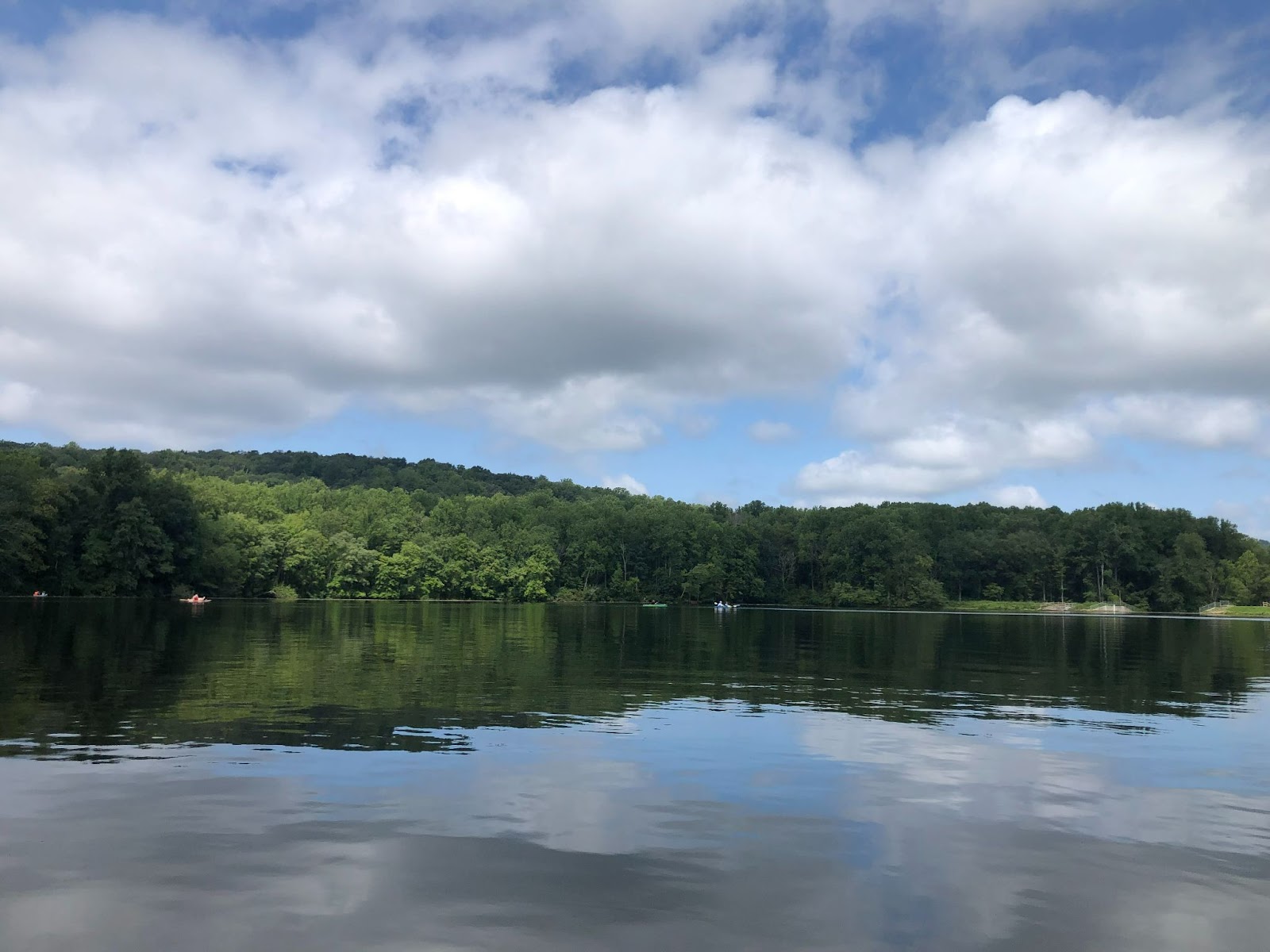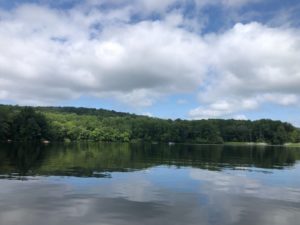
Philadelphia, PA (September 16, 2022) Today, the United States Court of Appeals for the Third Circuit issued a decision affirming that Pennsylvania state legislators and municipalities lacked standing to challenge the Delaware River Basin Commission’s (“DRBC”) regulation banning fracking within the Basin. Additionally, the Court rejected arguments that the trust created by Article I, Section 27 of the Pennsylvania Constitution (the “Environmental Rights Amendment” or “ERA”) was injured by the fracking ban. In rejecting this argument, the Court explicitly relied on a joint amicus brief from Clean Air Council, PennFuture, and Widener University Commonwealth Law School.
In February 2021, the DRBC banned high-volume hydraulic fracturing (commonly known as “fracking”) within the Delaware River Basin. The ban reflected the Commission’s determination that fracking “poses significant, immediate and long-term risks to the development, conservation, utilization, management, and preservation of the [Basin’s] water resources.” The Plaintiffs—two Pennsylvania state senators, the Pennsylvania Senate Republican Caucus, and several Pennsylvania municipalities—then filed a lawsuit in federal district court challenging the ban. After the District Court dismissed the suit for lack of standing, the plaintiffs appealed to the Third Circuit and raised an argument that they had standing under the ERA.
The Third Circuit, citing Clean Air Council and its partners’ amicus brief, held that the legislative plaintiffs’ ERA argument “fundamentally misunderstands the ERA and would turn it ‘upside down’ if accepted.” The Court further held that the plaintiffs’ ERA argument “ignores the explicit purpose of the ERA and mistakes the unique public trust it created for a run-of-the-mill financial trust in which the trustees have a duty to maximize profits.” The Court concluded that the fracking ban “promotes the purposes of the trust and protects its corpus by preventing Pennsylvania’s natural gas reserves, part of the Commonwealth’s ‘public natural resources,’ from being depleted.”
Joseph Otis Minott, Esq., Executive Director and Chief Counsel of Clean Air Council, issued the following statement:
“We are thrilled that the Third Circuit recognized and re-affirmed what the Pennsylvania Supreme Court has already held in no uncertain terms: The state government is constitutionally obligated to protect our public natural resources by conserving and maintaining them for present and future generations, not by extracting and ‘maximizing’ the economic value of those resources. We are hopeful that this will deter future actions by Pennsylvania state and local public officials who would seek to consume, deplete, and monetize our natural resources, rather than uphold their sworn constitutional duty to conserve and maintain them.”
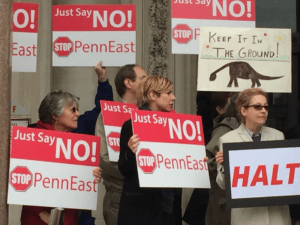
October 21, 2021 – Pennsylvania and New Jersey landowners woke up last week to news of the victory they have been working to accomplish over the last seven years: the PennEast pipeline, in a word, is dead. The company announced it would end development of its planned 118 mile, 36” diameter fracked gas pipeline from Luzerne County, PA to Mercer County, NJ.
PennEast had previously filed eminent domain proceedings against dozens of landowners in both states to build its dangerous and unneeded pipeline. For seven years, property owners in Pennsylvania and New Jersey faced lawsuits for asserting their private property rights and refusing to sell to PennEast pipeline. Hints of the pipeline’s impending demise came over the last several weeks as PennEast suddenly announced it would withdraw condemnation lawsuits against 70 property owners in Luzerne, Carbon, Monroe, Northampton and Bucks counties in Pennsylvania, and would similarly drop its plan to use eminent domain to acquire state-owned land in New Jersey.
The Council has opposed PennEast Pipeline from its inception investing time, community organizing, expertise, and legal resources into this fight. The Council:
- Called on the Delaware River Basin Commission (DRBC) and Governor Wolf to reject PennEast’s application.
- Urged the Pennsylvania Department of Environmental Protection (DEP) to hold meaningful public comment periods to assure that impacted community members would understand how the proposed pipeline would impact them.
- Participated in a scientific study by Cadmus Group to highlight the negative costs of the PennEast and Mariner East 2 pipelines on the Delaware River Basin’s ecosystems, economies, and population.
- Developed and submitted extensive technical and legal comments demonstrating to DEP the flaws in the proposed project permits.
- Sent federal agencies detailed comments explaining how the project was unneeded and harmful.
- Recruited our members to submit their own comments to state and federal agencies.
All that persistence has finally paid off.
In addition to preserving private property, residents and the Council have fought tirelessly for years to protect the 88 waterways, 44 wetlands, 30 parks, 33 conservation easements, and numerous exceptional value streams that PennEast would have crossed. The pipeline would have also plowed through some of the region’s most beloved conservation and recreation areas including Hickory Run State Park, Beltzville Lake, and Weiser State Forest.
PennEast is a private for-profit company that does not meet any public need. Its construction would have destroyed some of Pennsylvania’s most cherished natural resources and ecotourist areas, while its operation would have led to more fracking harms and climate-causing methane pollution. The end of PennEast is a huge victory for landowners, conservationists, and all those who recreate in our treasured state parks.
While the announcement is cause for celebration, lingering concerns remain as PennEast continues to make contradictory public statements about the possibility of moving ahead with a portion of the project in Pennsylvania only. This could pose a continued threat to conservation and recreation areas as well as streams, wetlands, and drinking water.
That is why Clean Air Council continues to work closely with our partners in Save Carbon County, New Jersey Conservation Foundation, Delaware Riverkeeper Network, Concerned Citizens Against the Pipeline, and Homeowners Against Land Takings (HALT) to ensure that this victory is final and permanent.
For more information contact Eve Miari, Advocacy Coordinator, emiari@cleanair.org
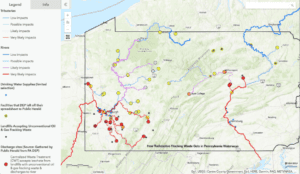
Growing up in Southwestern Pennsylvania is a beautiful experience. The region’s rivers, mountains, and picturesque small towns and beautiful cities make this an ideal place to live and grow up in. People in the area goboating, water-skiing, and swimming in the summers andhiking, snowboarding, and skiing in the winters. Fall brings beautiful,world-renowned colors, while spring is a budding new world to explore. Could you imagine a better place to live and raise a family?
However, there’s a terrible secret that the fracking industry has tried to hide from families living in the region: there is radioactive material from fracking appearing in our waterways and drinking water.
The fracking industry has taken advantage of an outdated loophole in PA law that labels fracking waste as residual waste. This is known as the radioactive fracking waste loophole. This dangerous loophole permits industry to dump radioactive fracking waste in local municipal landfills, which then turns into a watery substance called leachate. While there has been in-depth reporting on the gas industry’s radioactive secret, including from reporter Justin Nobel from the Rolling stones, many Pennsylvania residents remain unaware.
One landfill in Westmoreland County is threatening the entire Monongahela River when it knowingly accepted radioactive waste. The leachate from the fracking waste in this landfill became radioactive, and was piped directly into the Monongahela River to the Belle Vernon sewage treatment plant.
Water treatment centers in the surrounding region were confused about why all of their beneficial bacteria were dying. The chemicals released by the radioactive leachate were killing everything good and bad. Despite the public health impacts from the radioactive leachate, the Pennsylvania Department of Environmental Protection lets operations continue at the landfill company with only a small fine.
No resident should be forced to deal with radioactive material in their drinking water. Shockingly, most Pennsylvanians that live in Southwestern Pennsylvania are being exposed to radiation.
The solution is simple. We must close the fracking waste loophole by labeling fracking waste as radioactive. This would prevent the oil and gas industry from being able to dump radioactive fracking waste in municipal landfills.
Clean Air Council is supporting legislation in the Pennsylvania House and Senate introduced by House Representative Sara Inamoratoe and Senator Katie Muth that would repeal the language under Title 58 that exempts the oil and gas industry from complying with the provisions of the Solid Waste Management Act and classify drilling waste as “hazardous waste” under the Solid Waste Management Act.
The Council is dedicated to ending this radioactive fracking waste loophole and protecting drinking water for the millions of people who depend on it in Southwestern Pennsylvania .
For more information about this issue, please contact Lois Bower-Bjornson, Outreach Coordinator, lbb@cleanair.org
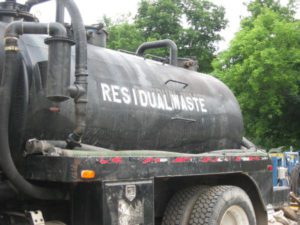
Photo: Iris Marie Bloom
Clean Air Council and its allies achieved a major victory in March in their efforts to ensure that the voices of Pennsylvanians are heard when it comes to fracking and the toxic waste it produces!
While many people know that the fracking industry pollutes the air and water, a lesser-known aspect of the process is how the industry handles and recirculates the toxic liquids fracking generates. When drilling a gas well, several different types of waste liquids need to be disposed of. First, there is “produced water,” which refers to a type of brine that comes up and out of the gas well from underground. Although it is naturally occurring, it is noxious and harmful if mixed with surface or groundwater. Next is “flowback,” which is the liquid that comes back up after being injected into the fracked well. This includes a chemical cocktail of fracking fluids and whatever happens to be picked up deep underground. Drilling fluid waste and other oil and gas liquids wastes also need to be dealt with.
The Pennsylvania Department of Environmental Protection allows gas companies to collect this waste in tanks and pits and then process and reuse it. Though DEP calls this “beneficial use,” the liquid wastes are used to frack more wells — and there is nothing beneficial about that. These dirty operations often spill their toxic waste and rack up violations.
DEP first created a general permitting process for these waste facilities a decade ago. Each permit issued then lasted ten years. As these permits were ready to expire at the close of 2020, the Department revised the general permit. Under the revised plan, the public would have notice of any proposals for waste facilities to be covered under the new permits and an opportunity to provide comments and feedback on those proposals.
However, once DEP finalized the general permit, it went right ahead and issued the approvals for almost all of the fracking waste facilities in Pennsylvania without giving the public a heads-up or opportunity to comment. All of a sudden, 49 facilities had the go-ahead to continue or expand their operations without neighbors or the broader public even having had a chance to review their plans to see if they are flawed or risky.
The environmental community in Pennsylvania came together and demanded that DEP reverse course and allow the public to weigh in on these plans for fracking waste facilities. Following up on that request, the Pittsburgh Post-Gazette on February 10 came out with an editorial calling on DEP to revoke the permits. Although DEP had not opened a comment period, groups still had the opportunity to appeal the permits within 30 days — which was coming up soon. Acting quickly, Clean Air Council joined with its allies to prepare to appeal as many permits as was necessary to ensure that flawed plans for fracking waste facilities would not go forward without scrutiny. The environmental groups and DEP put their heads together for negotiations and, on the eve of the permit appeal deadline, came to an agreement: DEP would provide the public with notice of all 49 permit applications and open up a comment period on all of them. And flaws the public brought to DEP’s attention would be corrected in modifications to the permits. Because the appeal period was closing, the environmental groups could continue ahead with appeals of six of the sites.
This great victory provides the public with the chance to weigh in which had previously been denied. The most recent edition of the Pennsylvania Bulletin announces the 60-day comment period for the waste sites and gives the public instruction on how to submit comments. You can click here and scroll down to “General Permit Coverage for Residual Waste General Permits” to submit your comments today!
Fracking waste storage sites are some of the dirtiest operations around. We’re proud to have been a key part of the effort to ensure that the gas industry didn’t get a pass due to DEP’s mistake. And we’re not done yet: we appealed those six permits, so there’s more fight to come!
For more information, contact Alex Bomstein, Senior Litigation Attorney, at abomstein@cleanair.org
